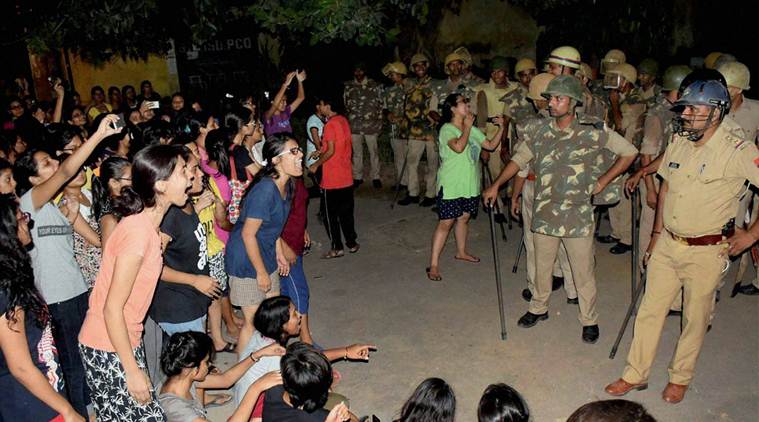The last couple of weeks at the Banaras Hindu University (BHU) campus have been turbulent as women students took to the streets to protest against the university management and the stance they seem to have taken, regarding an incident of molestation of a first year student right outside campus.
The incident, the students claim, is not an isolated one. Harassment is a lived reality for most female students at the BHU campus. So much so that the students have a unique word coined for it – “lanketing”. It comes from the Lanka market near campus where men often eve-tease, cat-call and molest students from campus.
To add to the ongoing tension, the protesting students were lathi-charged on Saturday, September 23rd, when they assembled outside the residence of the Vice chancellor GC Tyagi. A case was registered at the Lanka police station here under several sections of the Indian Penal Code (IPC), including 148 (rioting with armed weapon), 307 (attempt to murder), 353 (criminal force to deter a public servant from discharge of duties), 332 (voluntarily causing hurt) and 436 (destruction of immovable property).
The management has adopted a very defensive stance to this series of incidents. The student, on reporting the incident, was victim shamed and blamed for being out in the evening.
Also Read: छात्राओं पर लाठीचार्ज, बीएचयू की दमन-नीति का असली रूप है
Further discussion and debate ensued and the university students began protesting when the management turned unresponsive. Vice-chancellor TG Tripathi has gone on record to call the incident ‘a simple case of eve-teasing’ not molestation and claims that the situation has been politicised. In further disturbing statements, he goes on to say ‘If we listen to every girl, we can’t run the university’. GV Tripathi also was quoted in an interview saying, ‘security for boys and girls can never be at par’. GV Tripathi retires on November 27 this year and has been disallowed from making any appointments from September 27.
The students expressing their anger and discontentment against the management have also made the protest a platform to address the gender discriminatory policies of the university that is unfair to its women students. The curfew for their hostels is 8 PM and 6 PM in one of the hostels, while the boys have a curfew of 10 PM. Any delay after the curfew hours needs to be pre-informed and the students have to explain the cause of their delay. WiFi facilities have only recently been provided in girl’s hostels and the menu in their messes does not include non-vegetarian food.
The girls have brought it to the notice of the management that the feeling of safety and security is absent for them in campus. Many of these students are not local students and hence the only place in the city they can call home is their campus. Their ‘safe space’ does not seem so safe anymore. They believe that lack of street lights, CCTV cameras and properly trained security guards along with the lax attitude of the management contribute to the air of insecurity that they generally feel due to the widespread cases of harassment on campus.
The recently elected Yogi government has removed three additional city magistrates and two policemen in connection with the baton-charge on students. An inquiry has been ordered to report the violence and excess committed by the police force on the students and the journalists. The students have raised questions against the state government taunting its ‘Anti-Romeo squad’ policy and its implications and effectiveness.
Harassment is a lived reality for most female students at the BHU campus. So much so that the students have a unique word coined for it – “lanketing”.
The students argue that stricter curfew timings, policing their movements within and outside campus, and introduction of ‘Anti-Romeo squads’ by the Yogi government is not the solution. They point out that they are being subjected to the patriarchal adage of the need for women to be protected by men. In the light of the ongoing protests, Sandhya Singh Kaushik from MMV College says that ‘Our girls are no less than any other; but they are sensitive and immature, and must be protected’.
Treating women as victims, perennially in need of help and support, infantilising them and taking away from them, their basic right of movement in public spaces is not a way of empowering them but tightening the shackles that already bind them.
Women’s visibility in public spaces has always been an issue of contention in the country. Universities across the nation have imposed curfew timings in hostels and have monitored the movement of its female students, especially after evening. The Pinjra Tod movement in Delhi University was to protest against such discriminatory and sexist practices. Essentially, the solution offered by the government and the university authorities is to deny access to public spaces for women wrapped the garb of safety, instead of making it safer for them to access it.
The BHU protests encompass in them some of these core issues of the Pinjra Tod movement, where the students argue for women reclaiming public spaces and their right to use these spaces without being subjected to harassment. As for the Yogi government and the university management, their apathy and indifference towards the protesting masses of students only highlights the strong roots of patriarchy and sexism in these establishments.
Also Read: बीएचयू की छात्राओं का प्रदर्शन और प्रधानमन्त्री का रूट परिवर्तन
Featured Image Credit: The Indian Express
About the author(s)
Sunaina Bose is a theatre enthusiast, pop culture junkie and an Austenmanic. In her free time (also when she’s procrastinating) she loves to take life changing quizzes like ‘What kind of pizza are you’.





Not completely agreed about that Lankenting means eve teasing . Term lankenting means taking tea with friends/ colleagues and cigarette smoking in evening. Totally falls accusations. Yeah exactly there is some issues about Hoatel Timing, Gender discrimination in Food serving.
Come out of your cave Gaurav Pandey! It’s sickening that even in 2018, there are a lot of male chauvinist dinosaurs attending university in India!
This is NOT 1818 or 1918! It’s high time ladies have the SAME rights and duties as men! Do you understand?